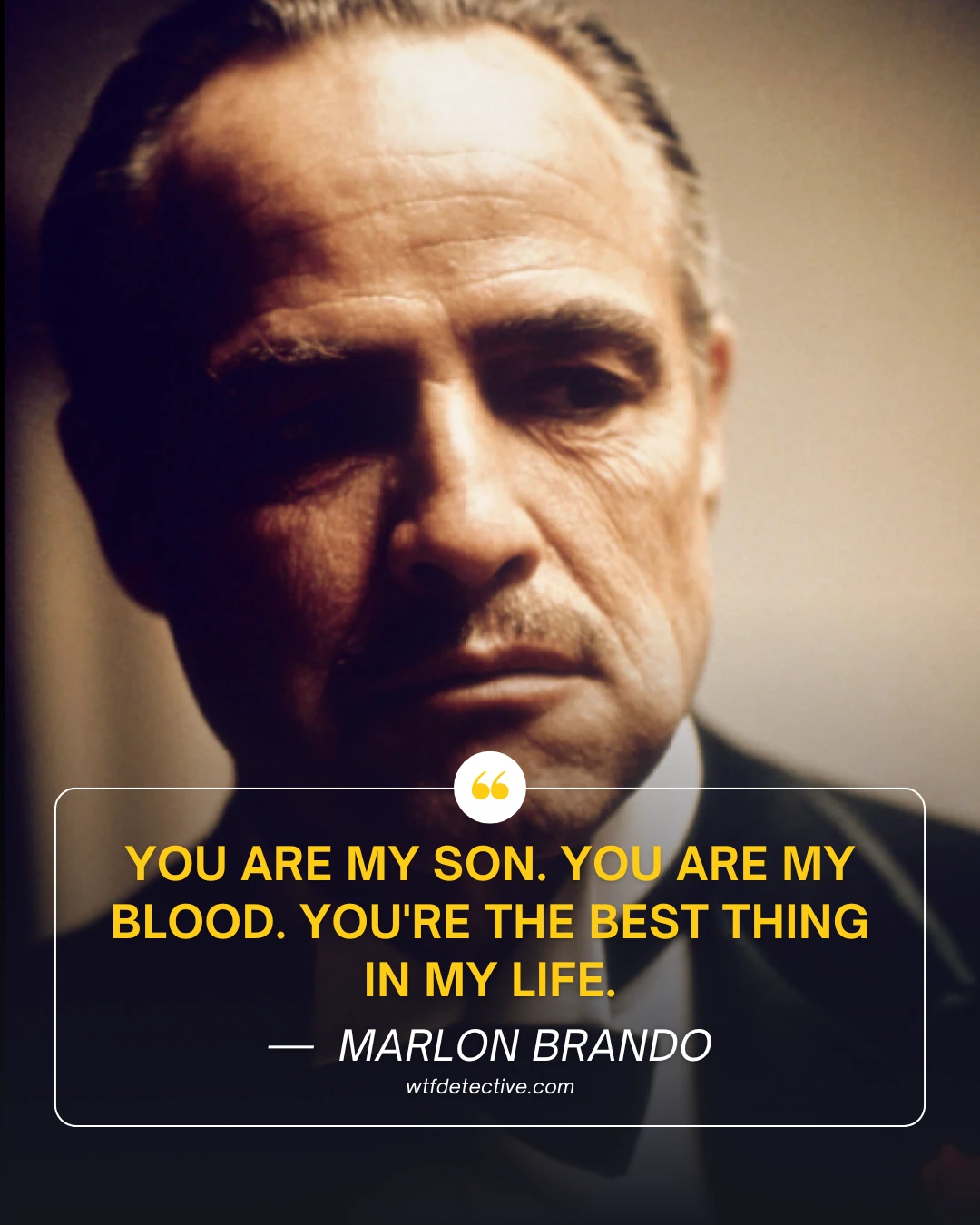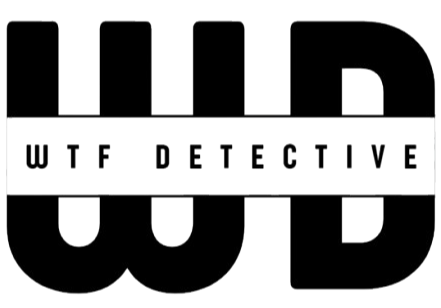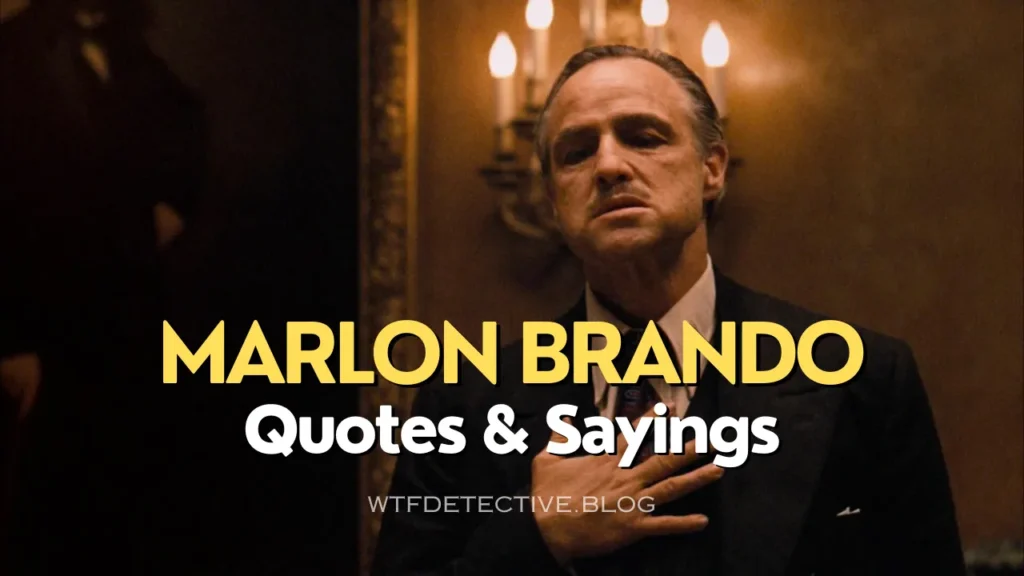Marlon Brando, an American actor, is considered one of the most influential figures in cinema. He was also an activist, supporting Native American and civil rights movements. Brando was among the pioneers of introducing Stanislavski’s system and method acting to mainstream audiences. He is best known for his iconic role in The Godfather films.
Enjoy the classic lines of one of the most important actors of the 20th century. From movies like A Streetcar Named Desire to The Score, here are some of our favorite quotes from Marlon Brando.
Marlon Brando, a highly influential American actor, was also active in Native American and civil rights movements. He introduced method acting to mainstream audiences, revolutionizing how actors approached their roles. Brando is most famous for his iconic performances in ‘The Godfather’ films.
“I’m gonna make him an offer he can’t refuse.”
In The Godfather (1972), Marlon Brando’s Don Vito Corleone utters this line to emphasize his power and influence in the world of organized crime. It encapsulates Don Corleone’s ability to wield authority through persuasive and sometimes ominous means, setting the tone for the film’s exploration of loyalty, family, and the consequences of power.
“I coulda been a contender. I could’ve been somebody.”
On the Waterfront (1954) features Brando as Terry Malloy, a washed-up boxer lamenting lost opportunities in life. His poignant reflection to his brother Charley reveals deep regret and a longing for what could have been, highlighting the film’s themes of redemption, moral courage, and standing up against corruption.

“You don’t understand! I could’ve had class. I could’ve been a contender. I could’ve been somebody, instead of a bum, which is what I am.”
Also from On the Waterfront (1954), Terry Malloy confronts his brother Charley about his compromised potential. This line underscores Terry’s bitterness and resignation to a life of mediocrity, portraying the harsh realities of ambition thwarted by external forces and internal conflict.
“I’m just a poor, dumb animal.”
In A Streetcar Named Desire (1951), Brando’s portrayal of Stanley Kowalski reveals his raw, primal nature. This blunt declaration to his wife Stella reflects Stanley’s rugged masculinity and disdain for societal expectations, echoing the film’s exploration of desire, power dynamics, and class tensions in New Orleans.
“You’re an errand boy, sent by grocery clerks, to collect a bill.”
Apocalypse Now (1979) sees Brando as Colonel Kurtz, delivering this line to Captain Willard amidst the chaos of war. It reflects Kurtz’s disillusionment with the military hierarchy and the absurdity of his own descent into madness, serving as a critique of authority and the futility of bureaucratic control in extreme circumstances.
“Look at me, Katie. I’m the future.”
From A Streetcar Named Desire (1951), Stanley Kowalski asserts his dominance over his wife Stella with this statement. It showcases Stanley’s arrogance and belief in his inherent power and virility, contrasting sharply with Stella’s vulnerability and the turbulent dynamics of their relationship.
“What do you want me to do? You want me to give up? I can’t do it. I can’t!”
In Last Tango in Paris (1972), Brando’s character Paul expresses his grief and emotional turmoil following his wife’s death. This outburst reveals Paul’s profound attachment to his past and his struggle to move forward, embodying the film’s exploration of identity, loss, and existential crisis.
“You’re one of the forces of nature.”
The Wild One (1953) features Brando as Johnny Strabler, a rebellious biker who acknowledges a woman’s impact on his life with this line. It portrays Johnny’s admiration for her free-spirited nature and suggests her influence as a powerful and captivating presence amidst the film’s exploration of youth rebellion and societal norms.
“The horror. The horror.”
In Apocalypse Now (1979), Colonel Kurtz’s haunting final words resonate with the darkness and moral decay he has witnessed in the heart of the Vietnam War. This enigmatic statement encapsulates Kurtz’s existential realization and critique of human nature’s capacity for cruelty and barbarism in extreme circumstances.
“You are my son. You are my blood. You’re the best thing in my life.”
From The Godfather (1972), Don Vito Corleone’s heartfelt declaration to his son Michael reflects his deep paternal love and pride. It emphasizes Don Corleone’s commitment to family loyalty and hierarchy within the mafia world, underscoring Michael’s significance as his heir and the embodiment of his legacy.
Top 20 Wiseset Marlon Brando Quotes, captions
The Godfather (1972) – “I’m gonna make him an offer he can’t refuse.”
On the Waterfront (1954) – “You don’t understand! I coulda had class. I coulda been a contender. I could’ve been somebody, instead of a bum, which is what I am.”
A Streetcar Named Desire (1951) – “I’m just a poor, dumb animal.”
On the Waterfront (1954) – “You wanna hear my philosophy of life? Do it to him before he does it to you.”
The Wild One (1953) – “Nobody tells me what to do. You keep needling me, if I want to, I’m going to take this joint apart. You’re not going to know what hits you.”
Julius Caesar (1953) – “The evil that men do lives after them. The good oft interred with their bones.”
Désirée (1954) – “Life is never simple, but I agree that being in love helps to make it less complicated.”
Guys and Dolls (1955) – “The companionship of a doll is a pleasant thing even for a period of time running into months. But for a close relationship that can last us through all the years of our life, no doll can take the place of aces back to back.”
The Teahouse of the August Moon (1956) – “Pain makes man think, thought makes man wise, and wisdom makes life endurable.”
One-Eyed Jacks (1961) – “You’re a one-eyed jack around here. I seen the other side of your face.”
Mutiny on the Bounty (1962) – “We need only persuade the British people of something they already know, that inhumanity is its poorest servant.”
Bedtime Story (1964) – “We’re the weaker sex, not women. We’re perishable, like ripe peaches hanging on a tree.”
The Chase (1966) – “The best thing about turning over a new leaf on Saturday night is it disappears with a Sunday morning hangover.”
The Nightcomers (1971) – “If you love someone you want to kill them.”
The Godfather (1972) – “A man who doesn’t spend time with his family can never be a real man.”
The Godfather (1972) – “I’m gonna make him an offer he can’t refuse.”
The Godfather (1972) – “Never tell anybody outside the family what you’re thinking again.”
Last Tango in Paris (1974) – “If music be the food of love, play on.”
Apocalypse Now (1979) – “Horror has a face, and you must make a friend of horror. Horror and moral terror are your friends. If they are not, then they are enemies to be feared. They are truly enemies.”
Apocalypse Now (1979) – “We train young men to drop fire on people, but their commanders won’t allow them to write ‘f***’ on their airplanes because it’s obscene!”
These quotes encapsulate the essence of Marlon Brando’s impactful performances across various iconic films.



